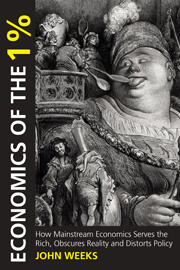Book contents
- Frontmatter
- Dedication
- Contents
- Preface: Doctor Bob's Third Law
- Introduction: Economic Ignorance
- Chapter 1 Fakeconomics and Economics
- Chapter 2 Market Worship
- Chapter 3 Finance and Criminality
- Chapter 4 Selling Market Myths
- Chapter 5 Riches, “Sovereignty” and “Free Trade”
- Chapter 6 Lies about Government
- Chapter 7 Deficit Disorders and Debt Delirium
- Chapter 8 Governments Cause Inflation?
- Chapter 9 Institutionalized Misery: Austerity in Practice
- Chapter 10 Economics of the 99%
- Notes
- Index
Chapter 7 - Deficit Disorders and Debt Delirium
Published online by Cambridge University Press: 05 April 2014
- Frontmatter
- Dedication
- Contents
- Preface: Doctor Bob's Third Law
- Introduction: Economic Ignorance
- Chapter 1 Fakeconomics and Economics
- Chapter 2 Market Worship
- Chapter 3 Finance and Criminality
- Chapter 4 Selling Market Myths
- Chapter 5 Riches, “Sovereignty” and “Free Trade”
- Chapter 6 Lies about Government
- Chapter 7 Deficit Disorders and Debt Delirium
- Chapter 8 Governments Cause Inflation?
- Chapter 9 Institutionalized Misery: Austerity in Practice
- Chapter 10 Economics of the 99%
- Notes
- Index
Summary
Peddling Nonsense
Right-wing politicians, famously the late Margaret Thatcher, preach that public finances should mimic the behavior of household budgets. There is truth in this homily, but not for the reasons that the reactionaries claim. The lesson they draw is that budgets should be balanced and debt is an evil to be avoided. They seem to take as unholy writ Benjamin Franklin's view that “the second vice is lying, the first is running in debt,” and “when you run in debt, you give to another power over your liberty” (both from Poor Richard's Almanack). In German and Dutch the word schuld means both “debt” and “guilt,” a double meaning that Poor Richard would no doubt endorse.
Thatcher's entreaty for governments to balance their budgets like households, and Poor Richard's equation between debt and loss of liberty represent ideology-manufactured clichés, at complete odds with how households manage their finances. A family “budget deficit” is an excess of expenditures over income for some specified time period, such as a month. The household debt consists of the value of all the loans and other liabilities (as in, “liable for them”) of the family.
In the US and most of Europe households buy their homes with a mortgage; that is, they go into debt. Few people would say, “Never take a mortgage, because all debt is bad.” My father did take this position, renting all his life.
- Type
- Chapter
- Information
- Economics of the 1%How Mainstream Economics Serves the Rich, Obscures Reality and Distorts Policy, pp. 121 - 140Publisher: Anthem PressPrint publication year: 2014

